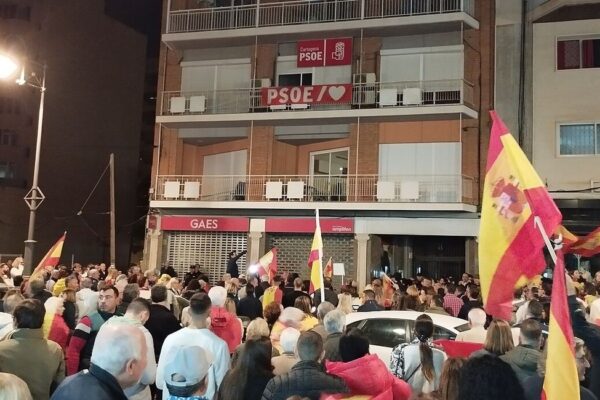While the Spanish people continue to take to the streets in protest against the President of Spain, the socialist Pedro Sanchéz, demonstrations that have lasted for almost a month and that have been marked by violence between police and demonstrators, little or nothing has been reported in the rest of Europe. News from Spain reaches us through social media or friends.
But what is happening in Spain? And what can Europe learn?
Before the general elections in July this year, in which the Partido Popular (centre-right) won with a relative majority, the PP itself ran a campaign in which it duly distanced itself from VOX, the conservative right-wing party. However, the leader of the PSOE (socialist) refused to do the same when it came to extremist forces, particularly those that included terrorist separatists and those convicted of blood crimes (Bildu, the nationalist separatist party of the Basque Country).
Unlike most European countries, Spain is a country of several nations and languages. This cultural difference and the way it is managed by the Spanish government have long been a source of radicalism, including terrorist attacks and attacks on the Spanish constitution, which does not provide for the independence of its autonomous regions.
The 2017 referendum, which aimed at Catalan independence, led Carles Puigdemont, the Catalan leader at the time, to go into exile abroad to escape Spanish justice, as well as nine other independence supporters.
After the elections with a relative majority for the Partido Popular, the socialist leader mobilized to form a government with the help of the pro-independence parties. Obviously, they would not allow the PSOE government to be viable without compensation. Considering that their main motivation is the divorce from Spain, they have little interest in governing Spain. In this sense, they ride on the coattails of those who want power at any cost, asking as conditions for their support an immoral and unconstitutional measure: amnesty for those convicted of attacks against the country and a referendum on independence.
The acceptance of these conditions by socialist Pedro Sanchéz marks the fall of the mask used by politicians that their decisions represent the collective good.
And suddenly, the worst ghosts about the Spanish Civil War, still so fresh, come back to the surface.
Alejo Vidal-Quadras, founder of VOX and former PP representative in Catalonia, is shot in the head in broad daylight, in an act that was little talked about in Spain, even less so in the rest of Europe, but which was all too reminiscent of the murder of José Calvo Sotelo. A deafening silence that did not move that country or the world as much as a kiss in the middle of the celebrations of the Women’s World Cup. Once again, the collectivist monster comes out of the most stale boxes whenever it smells of mass division.
Even so, the Spanish people take to the streets and make their voices heard: they do not want pacts with independence supporters, they do not want separation from the Spanish.
This separation and political war only favors the claim to power of a collective that shamelessly acts without any shame to maintain its power.
The voice of the Spanish people has been reduced to nothing – they have no voice on amnesty, they have no voice on secession from their own country. It was all arranged by two interested parties in this deal.
Logically, the right to secession should be provided for in the Constitution and the people should be called to vote on what they want their territorial organization to be. If that were the case, any decision would have legal and moral validity and the corruption of “votes in exchange for demands” would end.


